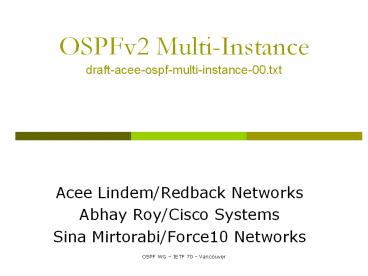OSPFv2 Multi-Instance draft-acee-ospf-multi-instance-00.txt - PowerPoint PPT Presentation
Title:
OSPFv2 Multi-Instance draft-acee-ospf-multi-instance-00.txt
Description:
OSPF WG IETF 70 - Vancouver. OSPFv2 Multi-Instance. draft-acee ... Could do something more radical to 'insulate' legacy implementations. Separate IP protocol ... – PowerPoint PPT presentation
Number of Views:26
Avg rating:3.0/5.0
Title: OSPFv2 Multi-Instance draft-acee-ospf-multi-instance-00.txt
1
OSPFv2 Multi-Instance draft-acee-ospf-multi-insta
nce-00.txt
- Acee Lindem/Redback Networks
- Abhay Roy/Cisco Systems
- Sina Mirtorabi/Force10 Networks
2
OSPFv2 Multi-Instance
- OSPFv3 supports multiple instances with an
Instance ID field in the header - Applications include
- Single link serving multiple communities of OSPF
Routers - Single link belonging to two or more OSPF areas
- OSPFv2 can do the same by using the first 8 bits
of the AuType as Instance ID. - Maps to unknown AuType for routers not supporting
it.
3
OSPFv2 Multi-Instance Header
- 0 1 2
3 - 0 1 2 3 4 5 6 7 8 9 0 1 2 3 4 5 6 7 8 9 0
1 2 3 4 5 6 7 8 9 0 1 - ----------------------
---------- - Version Type
Packet length - ----------------------
---------- - Router ID
- ----------------------
---------- - Area ID
- ----------------------
---------- - Checksum Instance
ID AuType - ----------------------
---------- - Authentication
- ----------------------
---------- - Authentication
- ----------------------
---------- - OSPFv2 Packet Header
4
Backward Compatibility
- Backward Compatibility Issues with
implementations logging errors - Can they cause more drastic issues?
- Could do something more radical to insulate
legacy implementations - Separate IP protocol
- Separate Multicast IP Address
- Authors dont feel this is necessary - begs
question as to why we dont redesign the protocol
- Implementations should already silently ignore
unknown authentication type or, at least, rate
limit the errors.
5
OSPFv2/3 Transport-Instance draft-acee-ospf-trans
port-instance-00.txt
- Acee Lindem/Redback Networks
- Abhay Roy/Cisco Systems
- Sina Mirtorabi/Force10 Networks
6
OSPFv2/3 Transport-Instance
- OSPF protocol has the extensibility to carry
arbitrary information - OSPFv2 Opaque LSAs
- OSPFv3 LSA function code
- All this information can potentially contend with
routing information - On the wire
- In the router
- This contention can impact timely route
computation and network convergence - Goal is to send non-routing information in a
separate OSPF instance
7
Transport Instance Packets Differentiation
- We can use Instance ID in OSPFv3
- We can introduce Instance ID in OSPFv2
8
Transport Instance Relationship to Normal OSPF
Instance
- Ships in the Night
- The Transport Instance has no relationship or
dependency on any other OSPF instance. - Child Instance
- The Transport Instance has a child-parent
relationship with a normal OSPF instance - is dependent on a normal OSPF instance for
topology information and assuring the "condition
of reachability".
9
Transport Instance - Ships in the Night
- Additional overhead as topology information must
be advertised to satisfy the condition of
reachability - Prefix information can be suppressed
- OSPFv2 Only router-LSAs, network-LSAs, and type
4 summary-LSA must be advertised. - In the router-LSAs, the stub (type 3) links may
be suppressed. - OSPFv3 Only router-LSAs, Network-LSAs, and
inter-area-router-LSAs must be advertised.
10
Transport Instance Child Instance
- Transport Instance will establish neighbor
adjacencies just like a normal instance. - Topology information is not advertized.
- Transport Instance will be dependent on its
parent instance to verify the "condition of
reachability" for any OSPF router. - Other optimizations are possible as well and are
under discussions.
11
Network Prioritization
- Transport Instance will use an on-the-wire
preference which is lower than normal OSPF
instance - dont contend with routing instance
- Use CS3 (011000) for Transport Instance
- Normal OSPF instances uses CS6 (110000)
- Applicable to both OSPFv2 and OSPFv3
12
Transport Instance Information Encoding
- TLV style encoding similar to Traffic Engineering
Extensions - OSPFv2 Application specific information will be
flooded in opaque LSAs - OSPFv3 Application specific information will be
flooded in separate LSAs with separate LSA
function codes. - OSPFv2 Application ID Opaque LSA ID (8 bits)
- OSPFv3 Application ID LSA Function Code (13
bits) - 8 bit Opaque LSA ID gives us 256 Applications (in
last 9 years only 4 values have been used). Is
that enough for future applications?
13
Next Steps
- How much innovation should be devoted to solving
this problem? - Instances can be separated with Instance ID
- Add Standardized packet deprioritization for
transport instance - Add omission of prefix information from transport
instance - Add sharing of topology information and possibly
other state information between transport
instance and corresponding standard OSPF instance
- Implies congruency restrictions - Working Group Document?































